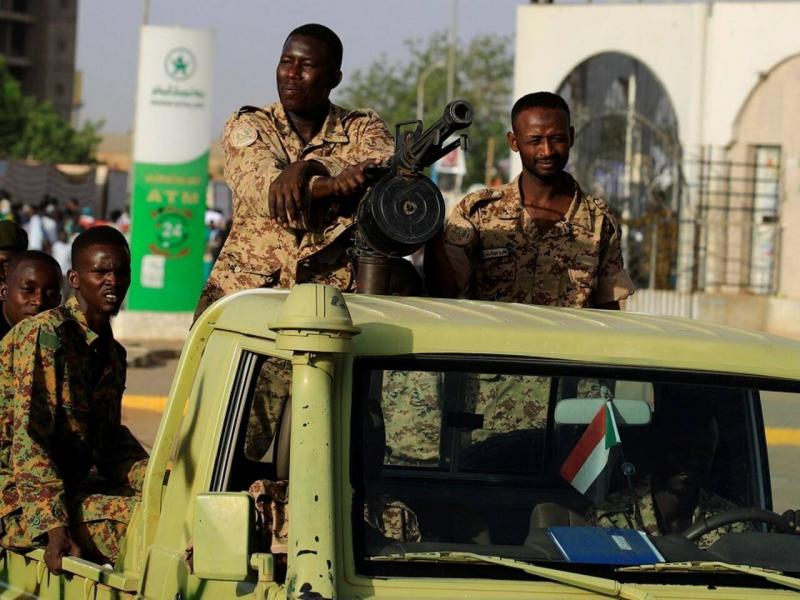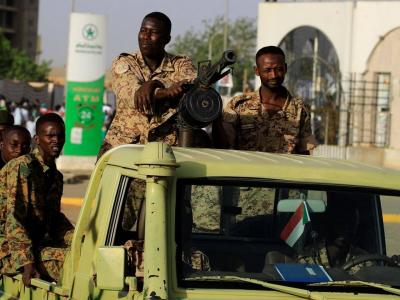Heavy clashes have resumed in Bahri and southern Omdurman today, Wednesday, marking a blatant violation of the ceasefire that has entered its second day. Eyewitnesses reported that a military aircraft crashed in Omdurman after its pilot managed to land safely using a parachute. It was noted that bodies are still lying on the sides of the roads, indicating a serious health crisis.
Fighting broke out this afternoon between the Rapid Support Forces and the Sudanese Army in eastern Sudan and the Al-Manashiya area, with sounds of airstrikes and artillery heard in the region. Additionally, organizations have been unable to deliver aid as outlined in the ceasefire agreement.
In a joint statement issued late Tuesday, Saudi Arabia and the United States announced they were seeking to verify claims of ceasefire violations in Sudan and that constructive discussions were ongoing regarding humanitarian assistance and its delivery. The two sides noted that "the conflict parties in Sudan have not committed to refrain from pursuing military gains prior to the ceasefire that began on Monday."
The statement also mentioned that representatives of the monitoring and coordination committee worked to "engage leadership from both sides in Sudan to discuss allegations of ceasefire violations." UN High Commissioner for Human Rights Volker Turk described the situation in Sudan on Wednesday as "devastating," calling on the warring parties to "stop the violence and protect civilians."
Turk elaborated that his office had received reports of combat aircraft usage and clashes in the capital Khartoum last night despite the ceasefire. He said in a press briefing in Geneva, "Many civilians are effectively trapped in areas experiencing relentless fighting." He added, "General Abdel Fattah al-Burhan and General Mohamed Hamdan Dagalo must issue clear and unequivocal instructions to their subordinates that there will be no tolerance whatsoever for sexual violence. Civilians' lives must be protected, and you must end this senseless violence immediately."
Turk confirmed that his office has documented at least 25 cases of sexual violence so far, with the actual number likely much higher.
The White House indicated that efforts are still ongoing with Saudi Arabia and the international community to ensure the continuation and monitoring of the ceasefire in Sudan, commenting that "the ceasefire in Sudan is a positive indicator and is largely holding despite reports of clashes."
In terms of the military situation, residents reported hearing artillery fire in areas of the Sudanese capital and that warplanes were flying over the city. However, the internationally monitored ceasefire reportedly led to relative calm after fierce battles in Khartoum.
Reports also indicated nighttime airstrikes in at least one area following the announcement of the ceasefire. Nevertheless, some residents described conditions as relatively quiet.
Activists wrote to the UN envoy to Sudan, welcoming the ceasefire agreement but complaining of serious human rights violations committed against civilians that they claimed occurred amidst the escalation of fighting, calling for an investigation into these matters.
Activists and relief workers noted that "neighborhood committees, which were at the forefront of local relief efforts in the capital Khartoum, are preparing to receive aid," pointing out that "large quantities of aid that arrived in Port Sudan on the Red Sea coast have not yet been distributed while waiting for security permits."
Doctors Without Borders, operating in ten states in Sudan, reported that "violence has erupted in parts of the country, including cities in the western Darfur region."
The Sudanese Ministry of Health stated that the Rapid Support Forces had assaulted and occupied Ahmad Qasim Hospital in Bahri shortly before the ceasefire took effect, and that they had also stationed themselves in another hospital in Bahri on Tuesday morning, a claim the Rapid Support Forces described as "lies."
The ceasefire agreement has raised hopes for respite from the conflict that has displaced nearly 1.1 million people from their homes, including over 250,000 who have fled to neighboring countries. A resident of Khartoum, Aatif Salah al-Din (42 years old), expressed, "Our only hope is that the ceasefire succeeds so we can return to our normal lives, feel safe, and go back to work."
Despite ongoing fighting during previous ceasefire periods, this is the first ceasefire resulting from an official agreement between the two sides after negotiations. The agreement includes a monitoring mechanism involving the army, Rapid Support Forces, and representatives from Saudi Arabia and the United States, who mediated the agreement following talks in Jeddah.
US Secretary of State Antony Blinken stated that the monitoring mechanism would be "remote" without providing further details. Blinken added in a video message, "If the ceasefire is violated, we will know, and we will hold violators accountable through our sanctions and other tools at our disposal."
He mentioned that "Jeddah talks focus on a defined scope: ending the violence and providing assistance to the Sudanese people. A lasting solution to this conflict will require much more."
Matthew Miller, a spokesperson for the Sudanese Foreign Ministry in a press briefing, said that "the United States will push both sides to stop the violence and will use additional tools if necessary."
Doctors Without Borders emphasized that "violence, looting, and administrative and logistical challenges have always hindered efforts to expand their activities." Jean-Nicolas Armstrong Dangleser, an emergency coordinator for Doctors Without Borders in Sudan, pointed out, "We are witnessing a violation of humanitarian principles, with the space available for humanitarian workers to operate shrinking to a level seldom seen before."
A senior Red Cross official stated that "Sudanese refugees are flowing into Chad at a pace that makes it impossible to transport all of them to safer locations before the start of the rainy season in late June, potentially leading to disaster."
Over 300,000 have fled to neighboring countries.
United Nations High Commissioner for Refugees Filippo Grandi announced today that more than 300,000 people have fled Sudan to neighboring countries thus far. He mentioned on Twitter that many of the refugees fleeing the conflict in Sudan crossed the borders into Chad and Egypt in recent days.
Relief workers indicated that many supplies and aid workers arriving in Port Sudan on the Red Sea are waiting for permits and security guarantees. The International Organization for Migration reported that over one million have been displaced within Sudan so far, while 319,000 have fled to neighboring countries, some of which are struggling with poverty and have a history of internal conflicts. Grandi stated that many of those fleeing have headed to Chad and Egypt in recent days.
He added in a tweet, "Donor contributions to the refugee response plan remain scarce. We urgently need more resources to support the countries hosting refugees." The United Nations reports that the number of people needing assistance within Sudan has surged to 25 million, or more than half the country's population.




